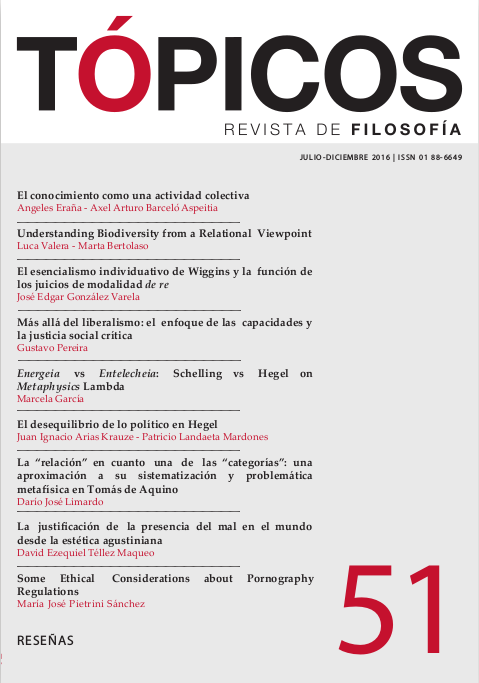Publicado 2016-07-01
Palabras clave
- Schelling,
- Hegel,
- Aristóteles,
- energeia,
- entelecheia
- acto ...Más
Cómo citar
Resumen
El último Schelling desarrolla un aristotelismo anti-hegeliano cuyo mejor ejemplo es su interpretación de la “pura actualidad” en el libro Lambda de la Metafísica. Contra la lectura “entelequial” de Hegel (el acto puro como actualidad que es a la vez actualización de algo potencial y culminación de un movimiento), Schelling subraya que dicha actualidad es pura ἐνέργεια, libre de toda potencialidad, es decir, de todo contenido y sin relación a movimiento alguno o su culminación. En este artículo, analizo las diferencias entre ambas interpretaciones desde la perspectiva de Schelling. Finalmente, discuto cuál es la ventaja que gana la propia filosofía tardía de Schelling al distinguir tan nítidamente entre ἐνέργεια y ἐντελέχεια.
Referencias
- Ackrill, J. (1965). Aristotle’s Distinction Between Energeia and Kinesis. In: New Essays on Plato and Aristotle. R. Bambrough (Ed.) (121-141). New York: Humanities.
- Aristotle. (1894). Ethica Nicomachea. Oxford Classical Texts. I. Bywater (Ed.) Oxford: Oxford University Press.
- ____ (1924). Aristotle’s Metaphysics: A Revised Text with Introduction and Commentary. W. D. Ross (Ed.) II v., Oxford: Clarendon.
- ____ (1956). De Anima. [DA] Oxford Classical Texts. W. D. Ross (Ed.) Oxford: Oxford University Press.
- ____ (1991). Ethica Eudemia. R. R. Walzer/J. M. Mingay (Eds.) Oxford: Oxford University Press.
- ____ (1996). Metaphysics. [Met.] G. P. Goold (Ed.) H. Tredennick (Trad.) II v. Loeb Classical Library. Cambridge: Harvard University Press.
- Anagnostopoulos, A. (2010). Change in Aristotle’s Physics 3. Oxford Studies in Ancient Philosophy 39, 34-79.
- Beere J. (2010) Thinking Thinking Thinking: On God’s Self-thinking in Aristotle’s Metaphysics L.9. Online Publication, 4.2.2010, https:// ancient-philosophy.hu-berlin.de/en/ancient-philosophy/hpold/ downloads/beere-thinking-thinking/view
- Boenke, M. (2004). ‚In den Ne en der Vernunft‘. Schellings reinrationale Philosophie. In Das antike Denken in der Philosophie Schellings. R. Adolphi; J. Jantzen (Eds.) (99-145). Frommann-holzboog, Stuttgart: Bad Canstatt.
- Bubner, R. (1995). Aristoteles und Schelling über Gott. In: Innovationen des Idealismus. (43-52). Göttingen: Vandenhoeck & Ruprecht.
- Burnyeat, M. (2008). Kinesis vs. Energeia: A Much-Read Passage in (but not of ) Aristotle’s Metaphysics. Oxford Studies in Ancient Philosophy 34, 219-292.
- Dangel, T. (2013). Hegel und die Geistesmetaphysik des Aristoteles. Berlin/ NY: De Gruyter.
- Ferrarin, A. (2001). Hegel and Aristotle. Cambridge: Cambridge University Press.
- Gabriel, M. (2009). God’s Transcendent Activity: Ontotheology in Metaphysics 12. The Review of Metaphysics, 63, 2, 385-414.
- Gill, M. L. (1989). Aristotle on Substance: The Paradox of Unity. Princeton: Princeton University Press.
- Halfwassen, J. (2005). Hegel und der spätantike Neuplatonismus. Hamburg: Meiner.
- Hegel, G. W. F. (1970). Theorie Werkausgabe. [TWA] In: Werke in zwanzig Bänden. XIX. Frankfurt a. M.: Suhrkamp.
- Inciarte, F. (2005). First Principles, Substance and Action. Studies in Aristotle and Aristotelianism. L. Flamarique (Ed.) Hildesheim: Olms.
- Kierkegaard, S. (2008). Journals and Notebooks. Volume 2: Journals EE-KK, ed. Capelørn et al, Princeton: Princeton University Press.
- Kosman, A. (2000). Metaphysics Λ 9: Divine thought. In: Aristotle’s Metaphysics Lambda. Symposium Aristotelicum. M. Frede / D. Charles (Eds.) (307-326). Oxford: Oxford University Press.
- Laks, A. (2000). Metaphysics Λ 7. In: Aristotle’s Metaphysics Lambda. Symposium Aristotelicum. M. Frede / D. Charles (Eds.) (207-244). Oxford: Oxford University Press.
- López-Farjeat, L. X. (2003). Hegel y Aristóteles. Una lectura de Metafísica XII, 7,1072b 18-30. Tópicos, Revista de Filosofía, 25, 19-33.
- Martin, Ch. (2012). Ontologie der Selbstbestimmung. Tübingen: Mohr Siebeck.
- Menn, S. (1994). The Origins of Aristotle’s Concept of Energeia: Energeia and Dynamis. Ancient Philosophy, 14, 73-113.
- Norman, R. (1969). Aristotle’s philosopher-God. Phronesis, 14, 63-74.
- Oehler, K. (1984). Der höchste Punkt der antiken Philosophie. In: Der unbewegte Beweger des Aristoteles. (99-116). Frankfurt: Klostermann.
- Schelling, F. W. J. (1856-1861). Darstellung der reinrationalen Philosophie [DRP]. In: Sämmtliche Werke. K. F. A. Schelling (Ed.) XIV v. Stuttgart: Cotta.
- ____ (1856-1861). Philosophie der O enbarung [PO]. In: Sämmtliche Werke. K.F. A. Schelling (Ed.) XIV v. Stuttgart: Cotta.
- ____ (1869-1870). Aus Schellings Leben. In Briefen. G. L. Plitt (Ed.) III v. Leipzig: Hirzel.
- ____ (1936). Le res de Ravaisson, Quinet et Schelling. Revue de Métaphysique et de Morale, 43, 487-506.
- ____ (1972). Grundlegung der positiven Philosophie. [GNP] Münchner Vorlesung 1823/33 und SS 1833. N. Helmes, H. Fuhrmans (Eds.) Torino: Bottega d’Erasmo.
- ____ (1990). On the Source of the Eternal Truths. [QEW] In: The Owl of Minerva. E. Beach (Trad.) 22, 1, 55-67.
- ____ (2007). The Grounding of Positive Philosophy. The Berlin Lectures. B. Matthews (Trad., Intr., and Notes). New York: SUNY.
- Tritten, T. (2012). Beyond Presence: The Later F.W.J. Schelling’s Criticism of Metaphysics. Berlin/NY: De Gruyter.






